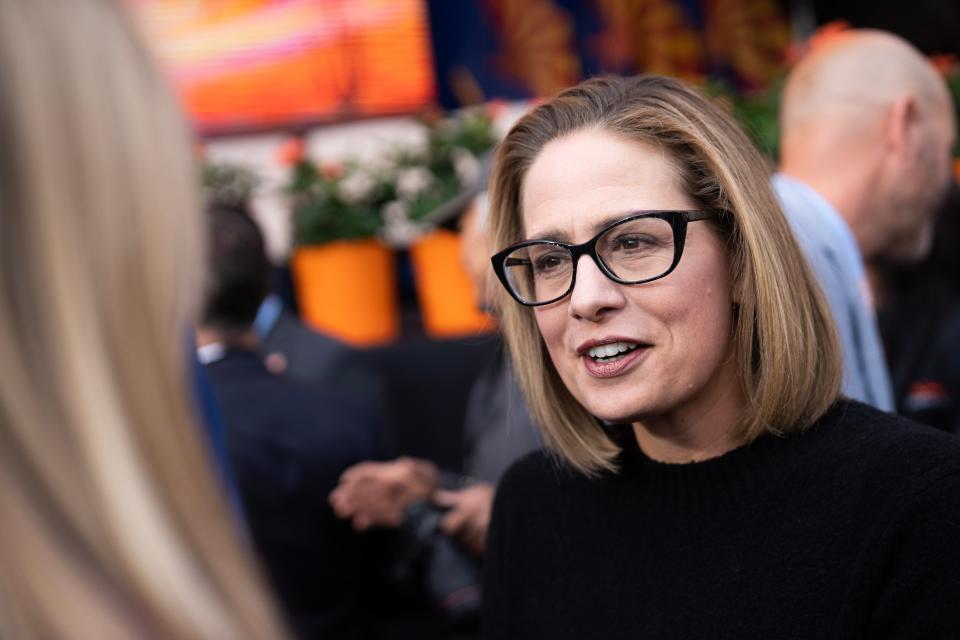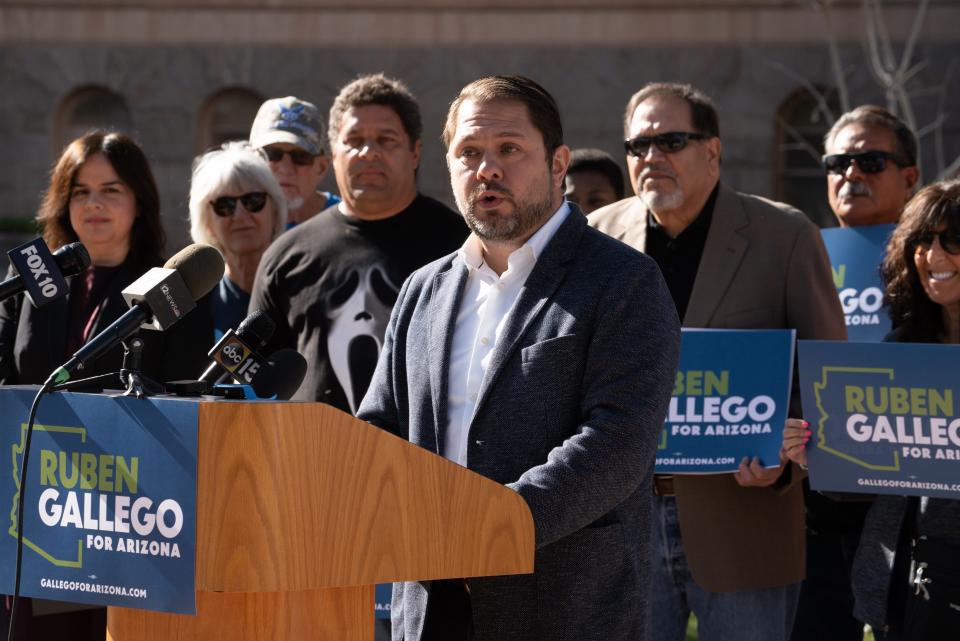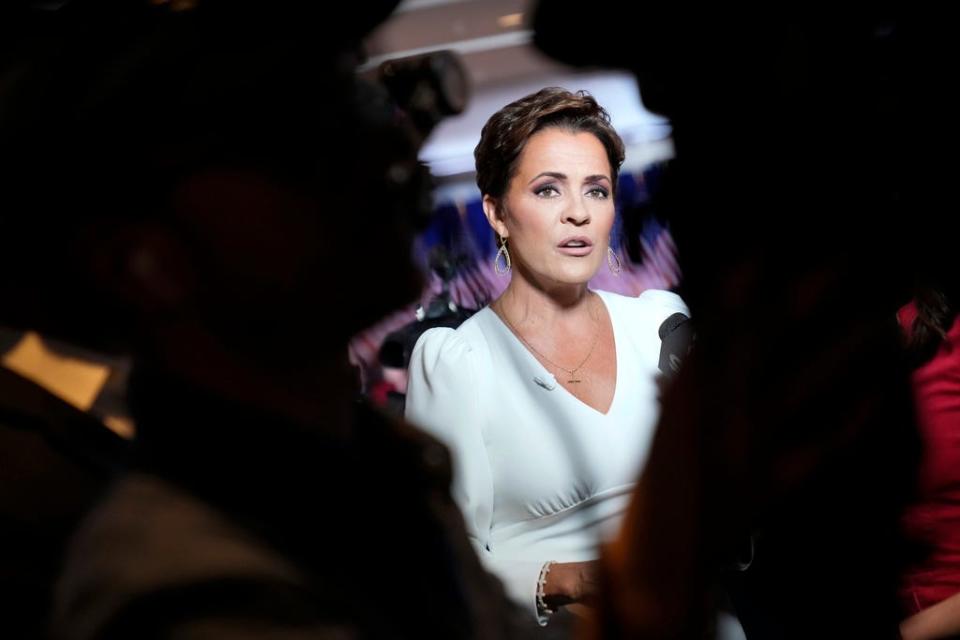'A barn-burner': Arizona's Senate race settles into Ruben Gallego vs. Kari Lake fight
Arizona for about a year stood out politically because of the prospect of an unprecedented three-way U.S. Senate race.
But after Sen. Kyrsten Sinema, I-Ariz., announced this week that she would not seek a second term, the promise of a new senator transforms the race into a more familiar scrum.
Arizona will have a Senate race for the fifth straight election cycle, with Democrats and Republicans both clamoring to hold their political bases while reaching for the stray independent.
A race that for months had centered on the question of whether Sinema would run and where her votes would come from if she did, now seems headed to a stark partisan choice.
Rep. Ruben Gallego, D-Ariz., is the only prominent member of his party running. He will face former TV news anchor Kari Lake, the Republican front-runner, or Pinal County Sheriff Mark Lamb, who is trailing in money and attention.

“I’m not changing the rating,” said Jessica Taylor, Senate editor for the nonpartisan Cook Political Report, which tracks races nationally. “I still see it as a toss-up and I think that’s because the state itself is a toss-up state in the presidential and when you look at the last few Senate races.”
Jacob Rubashkin, a deputy editor with the nonpartisan Inside Elections, said the race has more clarity than it has in months.
“Moving forward, what this looks like is something we’ve seen over the last three election cycles, which is a highly competitive, very expensive Senate race in Arizona,” he said. “The state is no stranger to this game now. … It’s going to be a barn-burner. There’s no other way about it.”
To political observers, the new dynamics sharpen the big questions that will settle the race.

Without Sinema in the race, Rubashkin said Gallego figures to benefit from a party that is fully united in a way it couldn’t be with Sinema still in the race.
“To me, the most important difference between a race that included Sinema and one that didn’t is there was a tremendous amount of trepidation among national Democrats over how much they could involve themselves in a three-person race because she’s still a sitting senator,” he said.
Republicans felt no need to go easy on Gallego or Sinema, Rubashkin said.
Taylor said Sinema’s departure clears the way for Senate Democrats to openly embrace his candidacy, which can translate into better fundraising moving forward.
“With Sinema, they had to do a delicate dance because they relied on her vote, too,” she said.
The fundraising battle is already heating up with Sinema out of the picture.
Lake's campaign said it raised $330,000 at a Republican fundraiser in Washington, D.C., that included 20 sitting GOP senators.
Gallego's campaign said it raised more than $1 million from nearly 24,000 donors in the first 24 hours after Sinema's retirement announcement.
Both Lake and Gallego continued to praise Sinema for her work in the Senate in a sign that both want the voters closer to the political middle that Sinema might have won.
“I would argue Sinema was never in a position to actually win. It was clear she had 10 to 15% of the vote that was in her corner. Those voters are now up for grabs. I think there’s going to be a ton of research and focus on who they are and how to win them over.”
“For Lake, my main question is can she stay disciplined?” Taylor said.

While there are suggestions that Lake is running a more professional campaign focused on taking down Gallego, on Wednesday Lake posted an insulting social media message noting Nikki Haley’s departure from the Republican presidential race.
Taylor said it invited the kind of distracting chatter that could undermine Lake’s effort to win over Arizona voters.
“I feel it’s sort of two steps forward, one step back,” Taylor said.
Rubashkin said Lake is well-known in the state and closely identified with the kind of election denialism that voters haven’t rewarded. Paradoxically, some Republican voters have looked past Trump’s denialism in a way they didn’t in 2022 with Lake in her gubernatorial loss.
Similarly, he said, Arizona Republicans who still admire the late Sen. John McCain, R-Ariz., may be more supportive of Trump than of Lake, even though both have memorably insulted McCain for years after his 2018 death.
It points to the possibility that Lake could underperform in Arizona compared to Trump, Rubashkin said.
Gallego, meanwhile, is a lesser-known quantity at the moment, which means he could fare better than President Joe Biden, who is consistently trailing Trump in polls in Arizona.
For Gallego, the question, Taylor said, is whether Arizona voters will embrace a Democrat more to the left than either Sinema or Sen. Mark Kelly, D-Ariz., both of whom played up their independence from partisan politics.
“He’s more progressive, and this is the battle for independents and who can win them over,” Taylor said.
Perhaps an even bigger concern is whether Lake’s political operating costs will leave her with too few resources when the campaign reaches peak interest months from now.
“Her burn rate is an issue. It does seem like more of official Washington getting behind her, but what I keep coming back to is Republicans wanted to avoid the types of candidates like Kari Lake," Taylor said. "And you have Kari Lake now. It still seems to me more of a marriage of convenience in many ways.”
This article originally appeared on Arizona Republic: Kari Lake vs. Ruben Gallego: How the Arizona Senate race is shaping up
